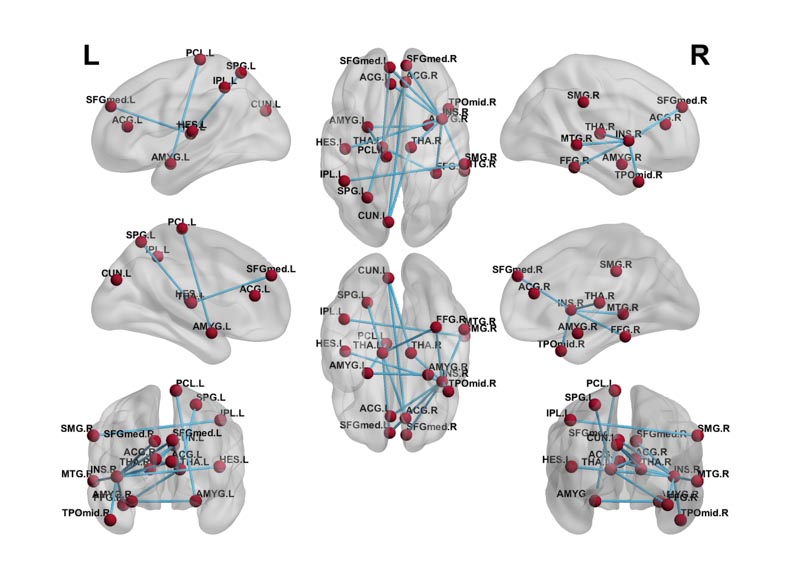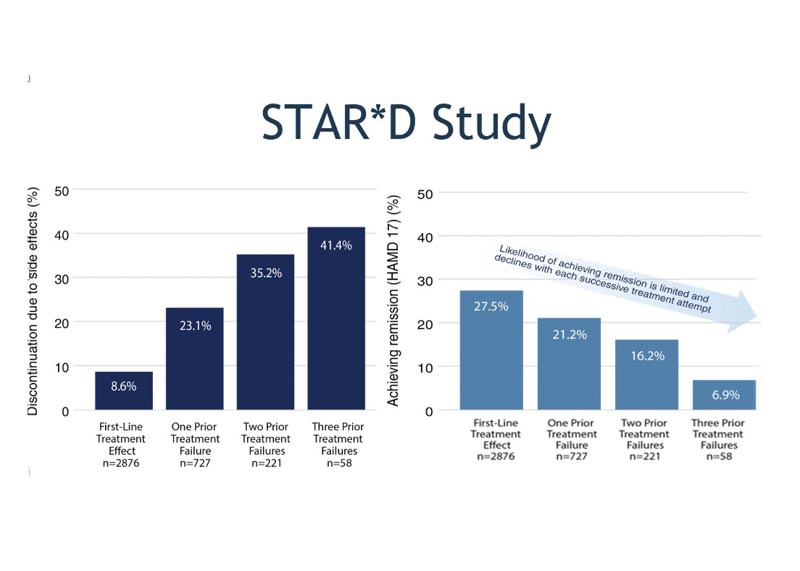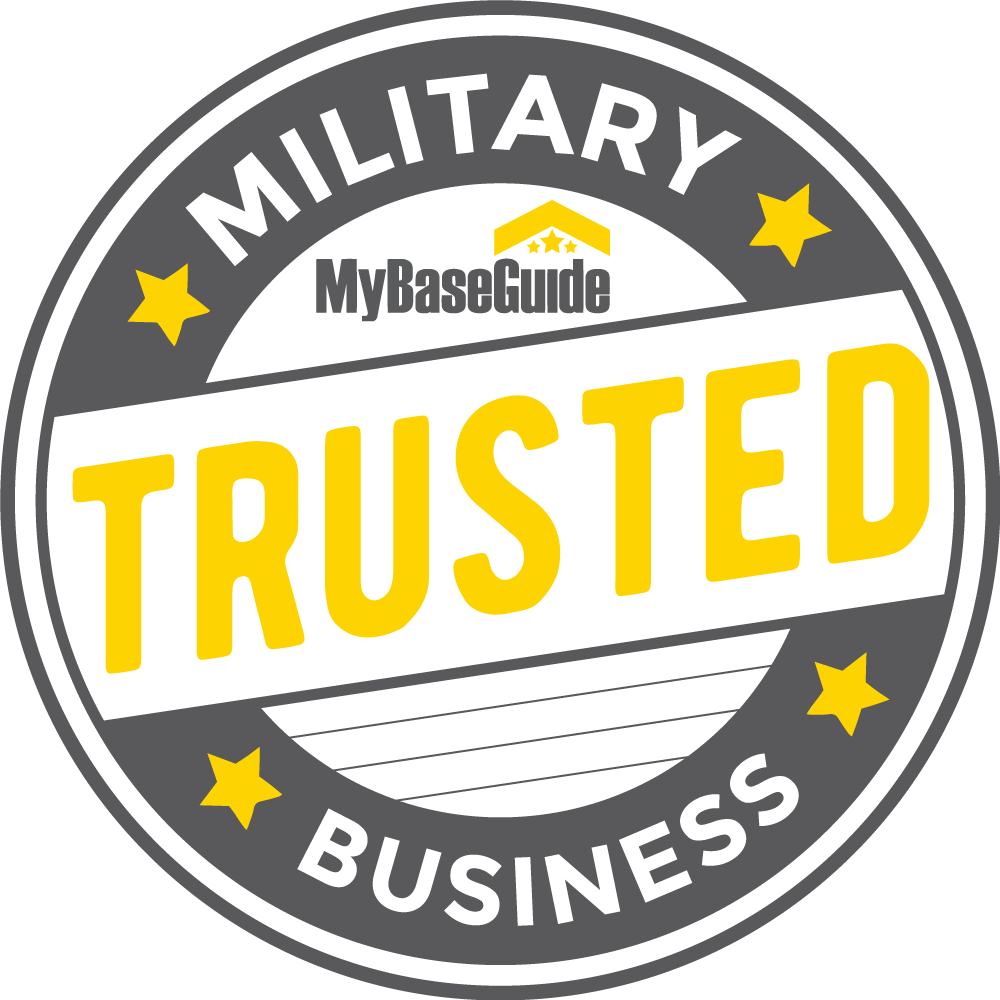TMS Therapies
TMS is short for Transcranial Magnetic Stimulation, an FDA approved therapy that uses gentle magnetic pulses to stimulate under-active areas of the brain.
Our Board Certified Doctors are experts at treating depression and anxiety with TMS having helped hundreds of patient with this treatment.
TMS is a life-changing alternative to medications for depression treatment. TMS is the no-medication pathway that can help you achieve peace of mind and better quality of life. TMS can be high frequency to speed up specific types of brain activity, which is perfect for treating depression. But TMS can also be performed at a low frequency to slow down the brain activities associated with anxiety, tremors, and insomnia.
Call 480-448-2916 to schedule a detailed evaluation.
Our Approach to Treating Conditions
At the TMS Institute, we strongly believe in helping individuals achieve therapeutic improvements with little or no medication reliance if possible in order to minimize long-term side effects associated with pharmaceutical use. We are setting the standard for advanced mental health and depression treatment in Arizona. Did you know:
- >95% of TMS centers and clinicians focus only on treating depression, but at the TMS Institute we are far more holistic. We know how TMS can be used for far more than just depression which is why we pride ourselves for thinking outside the box and treating multiple conditions.
- Evidence-based medicine and all the treatments we offer are based on protocols established and published in clinical trials.
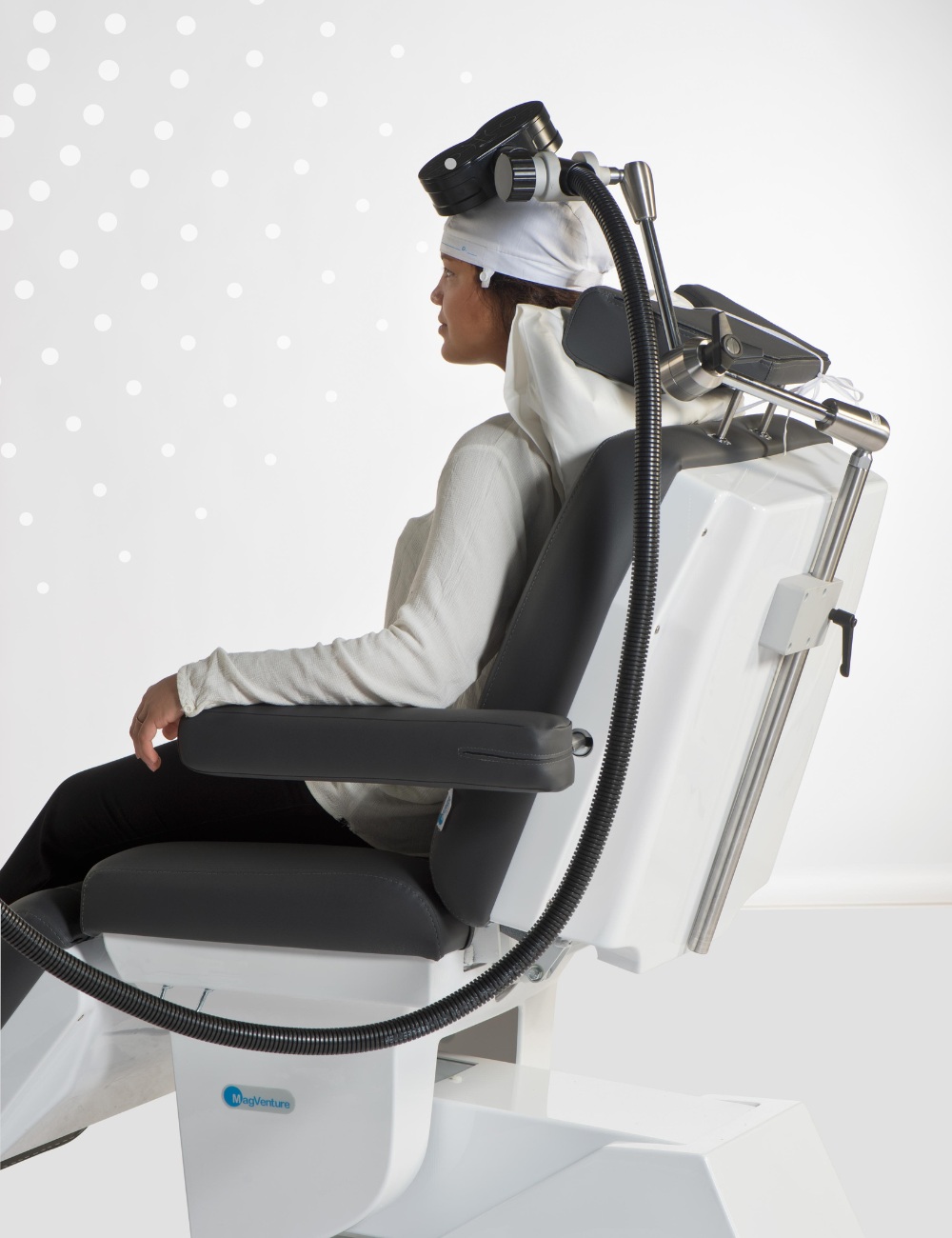
There are many benefits to TMS treatment, including:
- Can be a standalone treatment or used in conjunction with medications
- Covered by most insurance when treating depression (some coverage for treating OCD)
- FDA approved for depression, OCD, bipolar depression, smoking cessation
- High success rate – ~70-80% success rate with TMS vs 27.5% with the first medication and declining to 6.9% with the fourth medication
- ~50% of individuals completing TMS will achieve complete remission
- Highly effective
- In office appointments are fast and easy
- It’s not electroconvulsive therapy (ECT)
- Provides long-term results – at least 24 months of relief for up to 90% of patients but 35% of these patients may need additional maintenance TMS
- Medication free – an alternative to antidepressants
- No anesthesia required
- No systemic side effects
- Safe for all, including pediatric patients – studies have shown that children as young as 12 years of age tolerate TMS therapy just as well as adults and without any side effects
- Zero downtime
Video: What is TMS Therapy?
Video: Meet Richard, TMS Video Testimonial
Video: Meet Bari, Express TMS Video Testimonial
Video: TMS Q&A
Video: TMS Therapy and Depression
Video: Oliver’s Story
FDA-approved for depression, OCD, bipolar depression, and smoking cessation
TMS therapy is designed to improve functioning in the frontal lobe by increasing activity on the left side of the frontal lobe to reverse the asymmetry that results in depression.
Transcranial Magnetic Stimulation (TMS)
TMS is also known as rTMS (repetitive transcranial magnetic stimulation) because more than one magnetic pulse is delivered to the brain during a treatment session. It is also considered “traditional TMS” or just TMS. It requires one session per weekday for a total of 36 sessions spread over 4 – 6 weeks.
Each treatment session can be as short as 40 seconds to as long as 40 minutes depending upon the protocol and indication, making them easy to fit into your schedule. This treatment is FDA-approved for depression and obsessive-compulsive disorder (OCD) in adult patients. rTMS can also be used to treat other conditions such as anxiety, bipolar disorder, neuropathic pain, and other conditions.
Each treatment session can be as short as 40 seconds to as long as 40 minutes depending upon the protocol and indication.
How TMS Works
TMS utilizes magnetic pulses to trigger long-term change. This type of stimulation enhances the brain’s ability to change itself or “rewire” brain circuitry, helping to restore normal function. This means at least 24 months of relief for up to 90% of patients.
Different regions of the brain control different disorders. TMS can be used to target and stimulate these regions for a targeted treatment. The pulses are gentle, similar to the magnetic field created during an MRI scan, but much more localized. If you have had an MRI before, you know that nothing is felt during the scan. The same is true of a TMS treatment (but without the need to go into a machine, thus avoiding any claustrophobic moments).
TMS works very differently than medications. Medications have side effects and oftentimes risks such as dependency. Plus, TMS has been shown in studies to be more effective than medication in many patients.
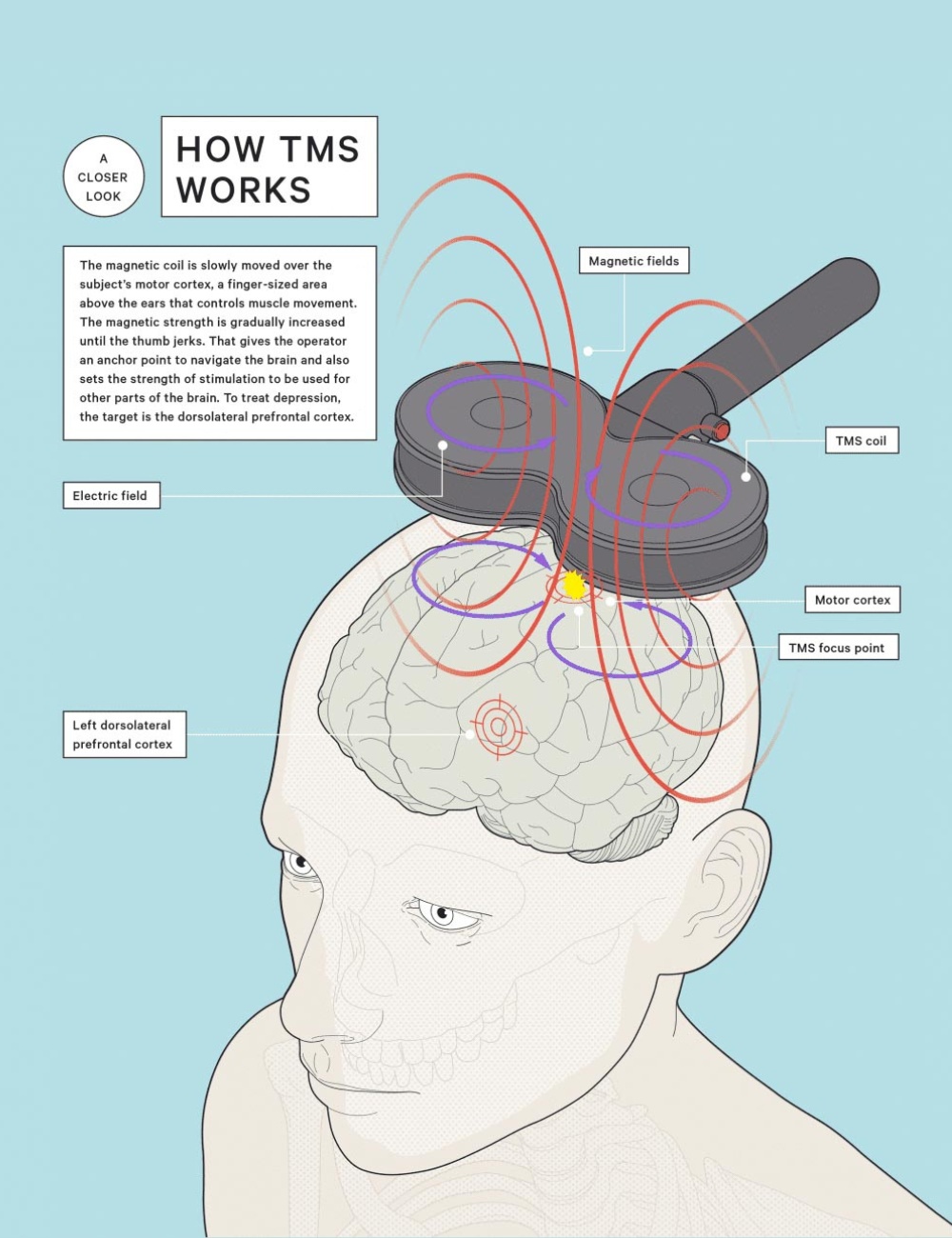
TMS Figure 1: Depicts how TMS stimulates connections between different regions of the brain (source)
TMS Institute of Arizona offers the most advanced form of transcranial magnetic stimulation, MagVenture TMS Therapy.
Express TMS Therapy
Express TMS, also called theta burst stimulation (TBS), uses a different treatment protocol (TBS) that shortens the treatment duration per session while providing a similar amount of brain stimulation as traditional TMS. Patients receive one session per weekday totaling 36 sessions spread over 4 – 6 weeks, but treatments are only 3 minutes each. The goal is to accelerate remission and/or reduce symptoms.
Express TMS is FDA-approved to induce strong and long-lasting effects using a lower stimulation intensity and a shorter time of stimulation. It is applied in 50 Hz triplet bursts five times per second. Pulses are delivered in a rapid cycle. This pattern is found to have an excitatory effect whose potency matches or exceeds the longer sessions of standard TMS.
Benefits of Express TMS
There are many benefits to Express TMS, including:
- An alternative to antidepressants
- Can be a stand-alone treatment or used along with current medication
- Fast in-office treatments
- FDA-approved with minimal side effects
- Highly effective in treating depression
- No anesthesia required
- No long-term side effects of memory loss as with ECT
- Non-invasive treatment
- Quick treatment: 3-minute sessions vs traditional TMS which is 19-37 mins
- Studies show TMS is at least 3 times more effective than medication
- The same high success rate as traditional TMS
- The same long-term results as traditional TMS
- Zero downtime
What To Expect with Express TMS
An initial consult with a clinician is required to ensure you are an appropriate candidate for the Express TMS® treatment. The first session is the Mapping Session, always performed by a physician in our center. This is where we will take measurements, mark the target treatment spot(s), and determine the appropriate stimulation intensity for you – your Motor threshold. Your customized setting is then programmed into the MagVenture TMS management system.
Depending upon your insurance coverage, the Mapping Session may be immediately followed by your first treatment.
During the treatment, magnets will generate a magnetic field and send pulses to the brain’s target site. You will hear clicking noises, similar to the sound of a MRI machine, and feel light taps on the scalp where the coil is stimulating the brain. You are fully awake for the treatment. Depending on the protocol, treatment sessions can vary, starting at 3 minutes. Most individuals cannot tolerate the goal stimulation strength on the first day, as it feels similar to mild scalp discomfort. This is why we usually start 5–10 points lower than the goal before gradually working up to your ideal.
Call 480-448-2916 to schedule a detailed evaluation.
Insomnia and TMS
There is a growing body of literature indicating that sleep loss and/or poor sleep quality greatly impacts the brain’s ability to form adequate neuronal connections (synaptic potentiation). This can result in reduced neuron activity and formation of new neural networks. In turn, this process can affect the brain’s response to TMS therapy. The TMS Institute of Arizona prioritizes ensuring that a patient gets optimal quality of sleep so that the brain is best equipped to respond positively to TMS therapy.

Call Our New Patient Coordinator for a Free Consultation.
Our New Patient Coordinator is here to answer all your questions so you can make the most informed decision.
She can explain our treatment options and protocols, fees, insurance, and more. She can also schedule you for a consultation with one of our doctors.
From there, we can determine if you may benefit from MeRT® or TMS treatment, and you can decide if you would like to move forward.
We hope you will consider getting more information.

